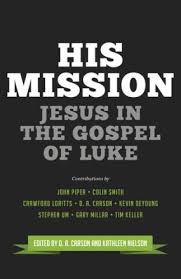This excerpt is adapted from the new multi-contributor volume His Mission: Jesus in the Gospel of Luke (Crossway/TGC, 2015). The Bible passage under consideration is Luke 4:14–30.
In Luke 4 we get fascinating insight into the preaching ministry of Jesus. Our Lord’s proclamation bears four distinguishing marks that sets the trajectory of preaching for all of us who share the privilege of speaking in his name today.
1. Jesus applied the Scriptures to the lives of his hearers.
He read from the book of Isaiah, then spoke about it. This was not unusual. The congregation in the synagogue would have been well used to a scribe, Pharisee, or layperson talking about Moses, Isaiah, or one of the other prophets. So much preaching can seem like a lecture about prophecies from the past or promises for the future, leaving ordinary people in the pew asking, “What in the world does this have to do with me today?”
But look what happens when the Bible is in the hands of Jesus! Prophecies from the past and promises for the future become gifts for today through him. “Today, this Scripture has been fulfilled in your hearing.” There was no wistful nostalgia for some golden age in the past, no sentimental platitudes about hope for a better world. No, Jesus said, “I am here to tell you there is hope for you today.” He took the Word that was “there and then” and brought it into the “here and now.” His message was not simply that God had done great things for others, but that the God who had done great things for others was ready to do great things for Jesus’s own hearers—and that he would do them through Jesus himself.
As J. I. Packer has observed, “The proper aim of preaching is to mediate meetings with God.” Christian preaching is more than imparting information; it is God’s means of bringing transformation. The test of our preaching is not whether our people can pass a Bible knowledge exam but whether they have encountered God and experienced the life-changing effects of his Word in their lives. This is what happened when God’s Son opened God’s Word.
2. Jesus spoke directly to the human condition.
Jesus identified four kinds of people to whom he came to bring good news: the poor, the captives, the blind, and the oppressed (Luke 4:18). The Bible uses these words to describe the condition not of some people, but of all before God.
To the wealthy, Jesus asks: “What does it profit a man to gain the whole world and forfeit his soul?” (Mark 8:36) To those who make much of their freedom, he observes: “Everyone who practices sin is a slave to sin” (John 8:34). To those who feel they can find their own way to God, Scripture declares: “The god of this world has blinded the minds of the unbelievers” (2 Cor. 4:4).
The clarity of our Lord’s description of the human condition is a powerful model for all of us who speak in his name today. Christian preachers are not called to flatter the already overinflated egos of lost people. Our commission is to speak the hope of the gospel with clarity and with compassion into the dreadful reality of our fallen condition.
3. Jesus preached himself.
It’s striking that Jesus’s message was focused on himself. In Luke 4:18 alone he refers to himself three times. Christ preached himself, and those who speak in his name must proclaim the same subject matter. When Jesus spoke, the eyes of all in the synagogue were “fixed on him” (v. 20). Good preaching always fixes the eyes of those who hear on Jesus.
Some years ago I was given a sabbatical and had the opportunity to hear sermons preached in churches from widely different traditions. I was struck by how often a supposedly “Christian” sermon began and ended without any explicit reference to Christ our Savior. Jesus preached himself, and we must preach him too. What good will your sermon do, or what hope or comfort can it bring, if Christ is not central in it?
4. Jesus proclaimed grace.
Grace was the central theme of Christ’s ministry. As people heard him speak this impressed them most, and their first response was to marvel at “the gracious words coming from his mouth” (Luke 4:22). Jesus’s communication of grace would have been evident from his announcement that he’d come to proclaim the year of the Lord’s favor (Luke 4:19). The Lord’s favor was an outpouring of grace, and the year of the Lord’s favor was the pinnacle of some wonderfully compassionate laws God gave his people Israel.
One of these laws was that every seven years all debts were to be cancelled (Deut. 15:1–2). Imagine if that was the law in America today. Suppose the people at Visa and MasterCard decided that every seven years they would wipe the whole slate clean and allow all their customers to start again with zero balances. But in God’s laws for Israel, that was only the beginning. At the end of every seven years, when debts were cancelled, slaves also were to be released (Deut. 15:12–14). When Israelites were unable to pay their debts, they could fulfill their responsibilities to their creditors by offering their labor in place of the money they couldn’t pay. But God said this kind of arrangement couldn’t continue beyond the seventh year.
Then God gave his most radically compassionate law of all. In the 50th year, after seven seven-year cycles of releasing debts and slaves, the trumpet was to be sounded and a jubilee proclaimed in the land.
How would you have liked to live under these laws? Your answer will depend largely on whether you’d have been a borrower or a lender. These laws were great for debtors, but very costly for creditors. But God had said, “You are my people, and this is what you are to do when I bring you into the land I will give you.”
How often do you think this year of jubilee happened? Never. Not even once. It’s not difficult to see why. The people with the power possessed the money, and when they looked at what the jubilee would cost them, they decided against it. So the trumpet never sounded; the year of the Lord’s favor was never proclaimed. And this flagrant flouting of God’s laws continued for centuries. No wonder the prophets were so scathing about the oppression of the poor when God’s laws for their protection were so consistently ignored.
Jesus Paid It All
No one in the entire history of Israel had come close to fulfilling this promise—until Jesus arrived at that synagogue in Nazareth, took the scroll from the attendant, unrolled it to the place where Isaiah prophesied the jubilee, and declared: “The Spirit of the Lord is upon me, because he has anointed me . . . to proclaim the year of the Lord’s favor.” Then, with the eyes of all fixed on him, he said, “Today this Scripture has been fulfilled in your hearing.”
“God is going to do for you,” Jesus was saying, “what you would not do for each other. He is going to cancel all your debts to him. He is going to set you free from Satan’s power and give you back the inheritance your forefather Adam lost.” That’s the promise of the gospel, and it is marvelous news.
But the year of the Lord’s favor, which brings such joy and blessing to us, came at incredible cost to Jesus. Think about this: if you write off a debt of a thousand dollars, you are down by a thousand dollars yourself. When God writes off our debt to him, he absorbs the loss in himself. This is why Jesus went to the cross. He bore the loss to cancel our debt and restore our lost inheritance. God cancelling debts in Christ. God releasing captives in Christ. God restoring lost inheritances in Christ. That’s the gospel. And it was central to the preaching of the one who paid the price himself.
Is there enough evidence for us to believe the Gospels?
 In an age of faith deconstruction and skepticism about the Bible’s authority, it’s common to hear claims that the Gospels are unreliable propaganda. And if the Gospels are shown to be historically unreliable, the whole foundation of Christianity begins to crumble.
In an age of faith deconstruction and skepticism about the Bible’s authority, it’s common to hear claims that the Gospels are unreliable propaganda. And if the Gospels are shown to be historically unreliable, the whole foundation of Christianity begins to crumble.




































